Despite having a single market for the outputs and the EU-agreed food standards, the Union has not been able to agree on harmonized fertilizer rules and a common set of bloc-wide requirements to register agriculture inputs. Such a set of rules would ideally include plant protection products, plant nutrition products, soil amendments and more. For the past two decades, Brussels has been working on harmonization of the rules for market access for agriculture inputs, although at a slower pace than most in the industry would wish for.
There are a few reasons believed to be behind the slow pace, including agriculture still being an important part of the economies of many EU member states as well as owing to environmental protection policies. Consumer protection has been more successful, likely driven by the enforcement of equal standards in the 28 EU member states. Fertilizer harmonization has also been among more successful stories, especially the “classic” fertilizers such as micronutrients. However, more progress needs to be made on the “new” fertilizers, bio-stimulants and soil improvers.
For all of these, manufacturers have to navigate throughout very complex and fragmented pieces of national legislations, with demands spanning from a simple notification to regulatory authorities to complex and costly dossiers. As a result, the products made available for European farmers depend on the complexity of the respective country regulatory system and market size. In bigger markets, the fertilizer-makers will register new products notwithstanding the complexity and costs of the registration process, while in smaller markets, the farmers are struggling to access new technologies.




